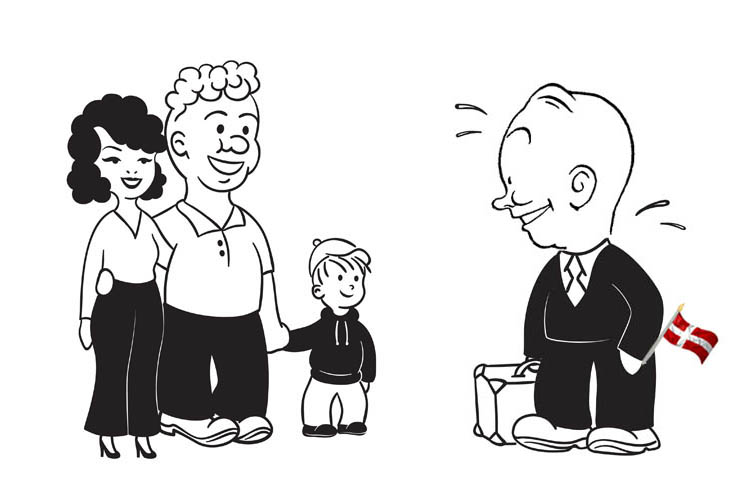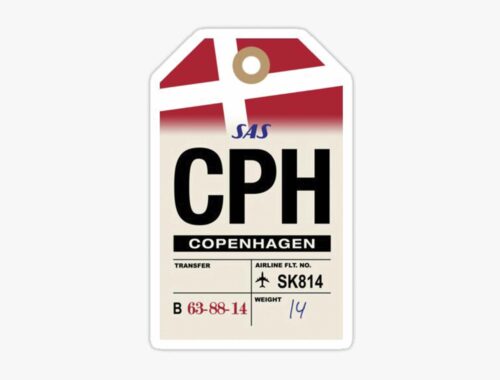As the new academic semester starts up, some of you may be planning to live in a Danish home. It could be you’ll rent a room in a household, maybe you’ll be part of a Danish host family, or maybe you’ll just be staying with Danish friends.
I thought it might be useful to have some tips on living with a Danish family.
First of all, if you’re used to having your parents or domestic workers do most of the household chores – things are about to change.
Danish families generally don’t have live-in domestic workers. A few wealthy families with small children have au pairs, and it’s common to have a weekly cleaning person, but on a day-to-day basis, household chores are done by all the members of the family.
Male, female, young, old, everybody does their part. (In fact, statistics show that Danish men do more household chores than any other men in Europe.)
Get prepared to do household chores
So, if you’re going to live as part of a Danish family, there will probably be household chores for you, too. If you don’t know how to wash dishes, or clean a floor, or do laundry, have somebody teach you before you leave home.
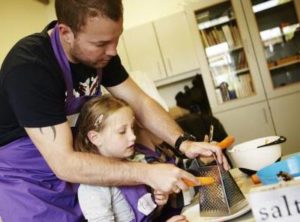
Everyone cooks in Denmark
You should also have one or two basic meals you can prepare if it’s your night to cook. It’s common for the family to take turns cooking or to cook together, and sometimes for the kids to cook on their own.
Foreigners are sometimes alarmed to see Danish kids as young as 8 or 9 using big, sharp kitchen knives. But kids often learn how to cook at school, and if both parents are working full time, it’s considered quite reasonable to ask the kids to cut up the salad or peel the potatoes. Plus it’s fun to be in the kitchen together.
Your family might ask you to take a turn making dinner some night, so definitely be prepared with a couple of recipes you know well.
At the dinner table
When you sit down at the dinner table, you generally don’t begin eating until someone says, Værsgo og spise. That translates to “go ahead and eat.”
You usually serve yourself from common dishes, and you should eat everything you choose to put on your plate. Wasting food is very bad manners in Denmark. Ask before you take the last bit of anything – would anyone else like to share this with me?
And when you’re done eating, you often sit at the table for a while and chat.
This was a surprise for me coming from the US, where you generally get up as soon as you’re finished. In Denmark you stay at the table longer, extend the conversation.
When you do finally get up, you say Tak for mad or “Thank you for the food” and take your own dish into the kitchen.
And, if it’s your turn, clean up the pots and pans. Basically, nobody in Denmark is too fancy for domestic work.
“Airing out” is a national passion
Danish homes are usually tidy. There is not a lot of stuff and clutter, and people do not wear shoes or boots inside. You take them off at the door, and sometimes have special cozy slippers for home wear.
Danish homes also are usually designed to let in as much light as possible, because it’s so dark in Denmark in the winter. So the curtains are often left open. (You can see what the neighbors are up to!)
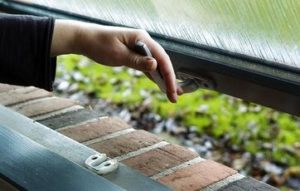
“Airing out” is a national passion
And while Danish homes are built to keep in heat to preserve energy, one thing they are not is well-ventilated. So you’ll notice your Danish hosts doing a lot of “airing out”, opening the windows and doors even in the middle of winter to get fresh air and keep toxic mold from growing.
Don’t be offended if they ask you to “air out” your room, too – it doesn’t mean they think you’re smelly!
Putting bedsheets and bedcovers outside in the cold for a few hours to “air out” is another custom that confused me when I first came to Denmark. (Why are they hanging their quilts out in the snow?)
No bathtubs in apartments
One particular room that sometimes has no ventilation is the bathroom. I recently gave a speech to group of Italians in Denmark, and they were amazed that many bathrooms, particularly in apartment buildings, do not have a window.
They do not, and there is also no bidet – another shock for the Italians.
In many Danish apartments there is no bathtub at all, only a shower. (And in older urban apartments, the shower head is sometimes right above the toilet – better protect that roll of toilet paper!)
At any rate, if you’ll be staying in an apartment, you can probably leave your bath salts at home.
You’ll need “indoor shoes” at the gym
Most Danish homes also don’t have exercise equipment, like treadmills or exercise bikes. But there’s usually a good gym nearby. When you go to a gym, you’re expected to bring not just gym clothes but a separate pair of indoor shoes, with clean soles.
Don’t try to work out in your muddy, dusty outdoor shoes. Your fellow gym rats will not be pleased and they may even give you a little lecture about it. That happened to a friend of mine – it wasn’t a fun workout. She felt very attacked.
Yes, you must shower naked before swimming
When you go to a swimming pool, the Danish way is to shower very thoroughly without your suit – totally naked – before you go in.
The pool staff take this very seriously, because there’s not a lot of chlorine in Danish pools to kill germs. They keep the water clean by making sure everyone washes their hair and their bits before jumping in.
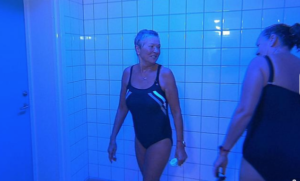
Checking swimmers for bacteria with a blue light
I read that one municipality was actually checking people with ultraviolet light before they went in the pool in order to make sure they’ve showered. So, yeah – take it all off, get clean, and then put your suit back on before you go in the pool.
Danes are pretty open about nudity, although old people tend to be much more comfortable with nudity than younger ones. In the locker room, you’ll see the 60 and 70-year-olds strip off in front of everybody while some younger people try to undress more discreetly.
Alcohol and social life
When it comes to social life, alcohol plays a very big role. Danish kids are often allowed to drink beer and sometimes wine at home from about age 13. The idea is that they can learn how to drink responsibly while their parents are still around to pick up the pieces. Whether or not this actually works is another question entirely, but that’s the expectation.
If the kids find themselves drunk out in the middle of nowhere, their parents will usually come pick them up.
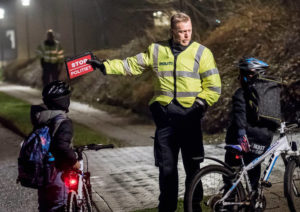
Danish cops will fine you if you don’t have a bike light
Otherwise, Danish families don’t spend a lot of time driving their kids around. It’s all about using mass transport, bus and train, even in the countryside. I recently visited a school on the west coast of Jutland where the school day was planned around the regional bus schedule.
There’s always bicycling too, and make sure you have your light after dark. You can get fined 750 kroner – about 100 Euro or 125 US dollars – if the cops catch you without a working red light on the back of your bike after sundown, or before sunrise on a Danish winter morning.
Talk it out
Those are just a few tips for living with a Danish family. As a general point of view, young people in Danish families have a lot of independence, but they’re also expected to take on a lot of responsibility. They’re expected to act like young adults instead of big children.
And if you have a problem in your Danish family, talk it out. Don’t let it simmer while you get angrier and angrier. Denmark is a talking culture, at least within the circle of family. If you’ve got concerns, questions – let them out.
The Danish family you’re living with wants to welcome you, and they want you to feel welcome too.
Buy Kay’s books about Denmark on Amazon, Saxo, Google Books, Apple Books, Barnes & Noble Nook, or via our webshop.
Image mashup copyright Kay Xander Mellish 2025
Read also:
A thatched roof over your head: Finding a place to live in Denmark

